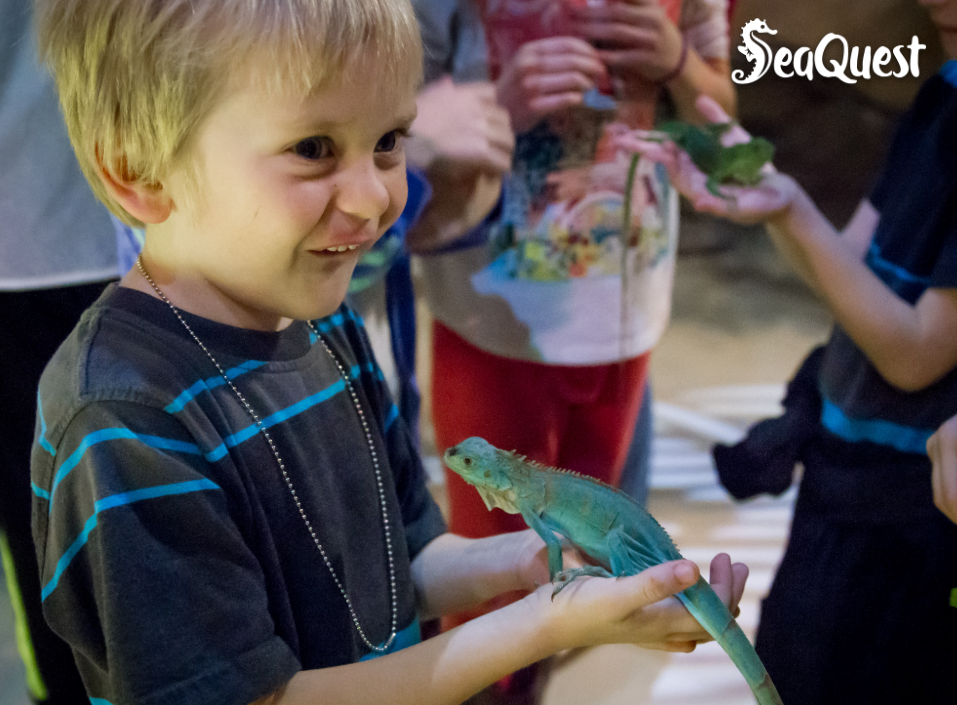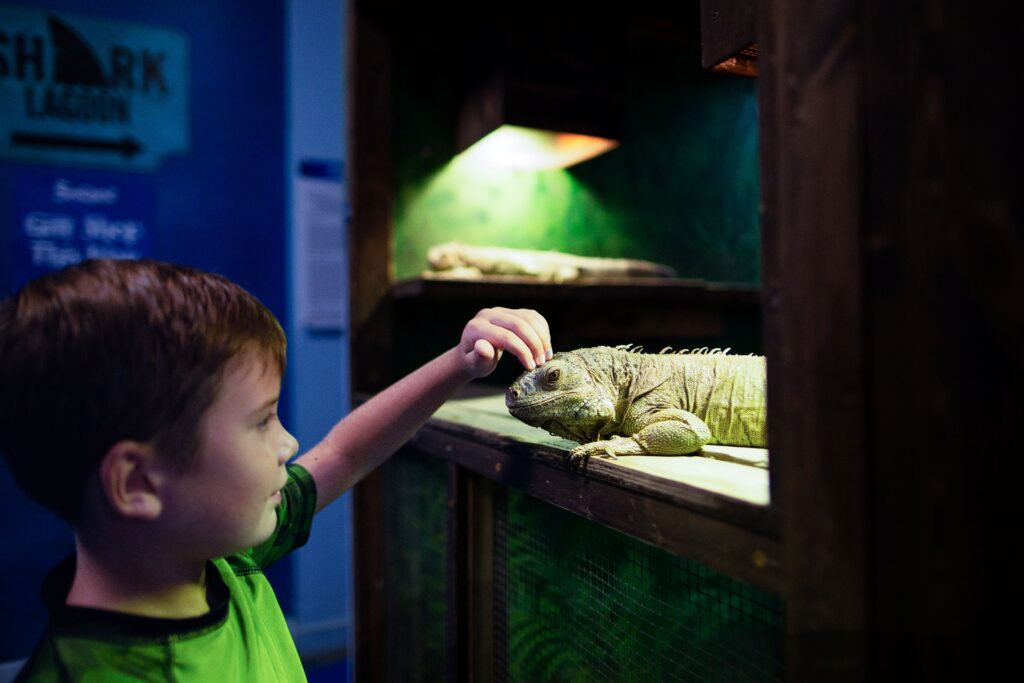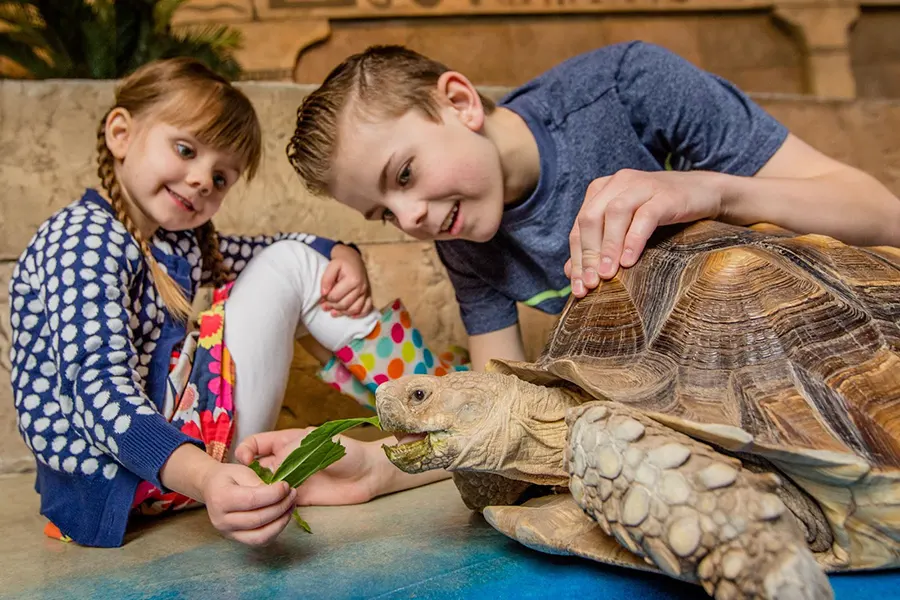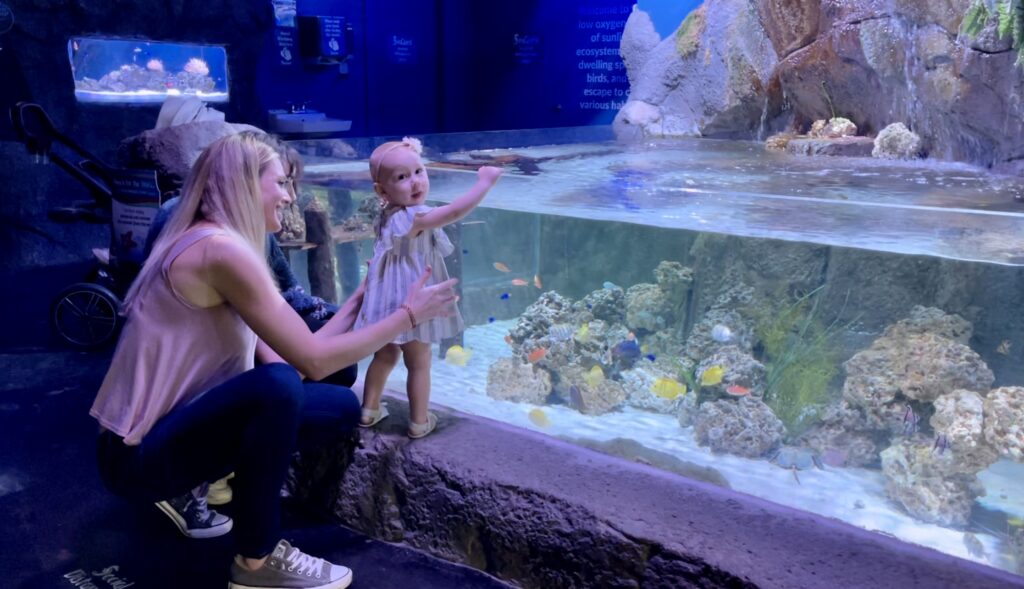How Are Iguanas at SeaQuest Cared For?
Share it on:
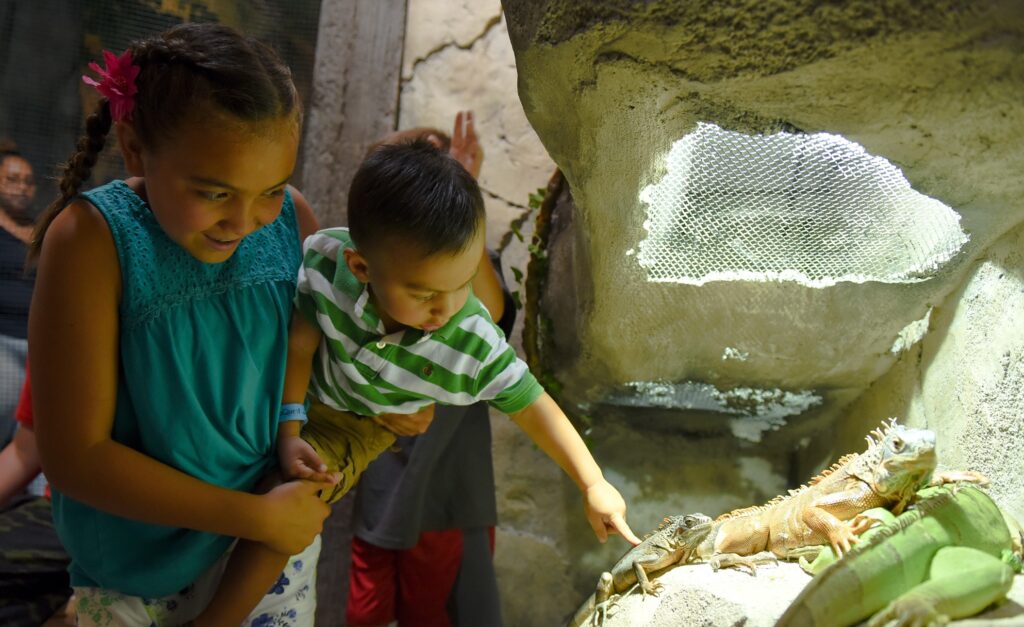
Iguanas are one of SeaQuest’s most popular animals. As more people become interested in these exotic reptiles, it’s essential to understand how they are cared for outside their natural habitats. Our ultimate goal is to replicate an iguana’s natural habitat as closely as possible, ensuring each animal is happy and healthy in its enclosure. Here’s an inside look at the efforts put into maintaining our facility’s high standards of iguana care.
Iguana Care at SeaQuest
SeaQuest recognizes the specialized needs of iguanas. We have dedicated considerable resources to mimic their natural habitats and support their well-being. From the humidity levels to the types of foliage used in their enclosures, we manage every detail to create an optimal living space for the iguanas. We design our iguana interactions with their wellness and safety in mind, ensuring they experience no stress.
SeaQuest’s specialized team consists of experts who are explicitly trained in the care and biology of reptiles. This team is responsible for all aspects of iguana care — from daily feeding and habitat maintenance to overseeing health check-ups and behavioral assessments. Respect is at the heart of our iguana care mission; we want these animals to feel happy and stress-free while in our custody.
Understanding Iguanas: Natural Behaviors and Habitats
When training all SeaQuest staff members, we teach them about the natural lives of our animals so that their lives at SeaQuest match their lives in the wild. Of course, this is a continual process, especially as we introduce new animals into their SeaQuest environment, including iguanas.
What Is an Iguana’s Natural Habitat?
Iguanas are native to tropical and subtropical environments across Central and South America and the Caribbean. These regions have warm climates, abundant rainfall, and high humidity, all essential conditions for iguanas to thrive.
At SeaQuest, the iguana enclosures are carefully designed to replicate these natural environments, with controlled humidity and temperature settings that mimic those of a tropical climate. The habitats also feature various vegetation and structural features such as branches and rocks that encourage natural behaviors like climbing and sunbathing, providing iguanas with a space that feels both familiar and stimulating.
Social Behavior and Individual Space
Iguanas are naturally territorial animals, and their need for personal space is critical to their well-being. SeaQuest carefully considers the spatial needs of these reptiles when designing their enclosures. Each iguana is provided with ample space to prevent stress and aggression, which are common in crowded conditions. Additionally, the SeaQuest team continuously monitors the iguanas for signs of social compatibility and adjusts their housing arrangements to ensure a harmonious living environment for all animals.
What Do Iguanas Eat?
Iguanas are primarily herbivores, feasting on a diet rich in leafy greens. At SeaQuest, we meticulously plan a dietary regimen to cater to each iguana’s nutritional needs, ensuring they receive the vitamins and minerals essential for their health. Regular health checks allow the care team to make necessary adjustments based on their health assessments and nutritional requirements.
The Health and Well-being of Iguanas
We want our iguanas to thrive and live their best lives here, so we prioritize iguana mental health in our daily operations.
Creating Optimal Living Conditions at SeaQuest Facilities
At SeaQuest, keeping iguanas healthy means recreating their natural living conditions. This includes using proper UV lighting in their habitats, which is essential for making vitamin D. This helps iguanas absorb calcium, keeping their bones strong. Humidity in their enclosures is also carefully controlled to ensure their skin stays healthy and they can breathe easily, which helps prevent respiratory infections and problems with shedding their skin. Regular cleaning and maintenance of the enclosures are crucial to keeping the areas clean and free from disease-causing germs and contaminants.
Veterinary Care and Health Monitoring
We monitor the health of each and every iguana in our care through routine veterinary check-ups. Any health issues are identified and addressed promptly. These assessments help prevent common health problems like metabolic bone disease, nutritional deficiencies, and parasitic infections.
Our veterinary team is equipped to provide specialized care and treatments tailored to the specific needs of iguanas, including dental care. Detailed health records are maintained for each iguana, documenting their medical history, dietary changes, and any treatment received. This comprehensive approach to health monitoring enables SeaQuest to maintain a high standard of care and ensures the long-term well-being of the iguanas under their protection.
Educational and Conservation Initiatives
We like to think beyond the enclosure, even for our iguanas. At SeaQuest, we also work to further the conservation of these reptiles worldwide.
SeaQuest’s Role in Iguana Conservation
SeaQuest actively participates in efforts to conserve iguanas and their natural habitats. This includes working with conservation organizations to protect wild iguana populations and supporting initiatives to preserve their natural environments. Additionally, SeaQuest’s educational programs are crucial in increasing public awareness about iguanas. These programs are designed to engage visitors and provide them with knowledge about iguanas’ critical role in their ecosystems, thus fostering a more profound commitment to conservation efforts.
Promoting Responsible Pet Ownership
SeaQuest also educates its visitors about the complexities of caring for iguanas in a home setting. Through comprehensive educational outreach, we provide potential iguana owners with the necessary resources and guidance to understand iguana care, including their dietary needs, environmental requirements, and overall health management. This initiative aims to ensure that iguanas kept as pets are well cared for and their needs are met.
By creating environments that closely mimic their natural habitats, providing expert veterinary care, and ensuring that each iguana receives individual attention, SeaQuest sets a high standard for animal care in captivity. Our holistic approach enhances iguanas’ lives in captivity and the wild, promoting sustainable coexistence with these remarkable creatures.

